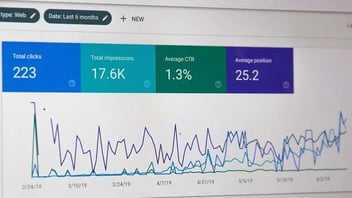Ghid de backlink-uri pentru startup-uri: de ce sunt importante?
Vă amintiți săptămâna trecută când ați verificat analiza site-ului dvs. și ați observat o vizită de la un "site de trimitere"? În urma unei investigații mai aprofundate, ați constatat că cineva a menționat startup-ul dvs. într-un articol despre tehnologia emergentă și a inclus un link către una dintre paginile dvs. de destinație. Mișto, nu-i așa?

Acesta a fost un backlink, și există un argument puternic pentru a petrece o parte din timpul și energia dvs. de marketing construind mai multe dintre acestea.
De ce contează backlink-urile?
-
98% din traficul motoarelor de căutare provine din rezultatele căutărilor organice. Dacă doriți ca site-ul dvs. web să fie găsit de potențialii clienți, trebuie să vă asigurați că acesta ocupă un loc important în paginile cu rezultatele motoarelor de căutare (SERP). Backlink-urile sunt unul dintre cei mai importanți factori pe care Google îi utilizează pentru a clasifica site-urile web, astfel încât crearea de backlink-uri este esențială pentru orice start-up care dorește să aibă succes online.
-
Site-ul web mediu cu 100 de backlink-uri primește cu 50% mai mult trafic decât unul cu Zero backlink-uri. Acest lucru arată că chiar și câteva backlink-uri pot face o mare diferență în traficul site-ului web.
-
Un studiu realizat de Backlinko a constatat că primele 100 de site-uri web au în medie 3,8 milioane de backlink-uri. Acest lucru arată că cele mai de succes site-uri web au un număr considerabil de backlink-uri.
-
Calitatea backlink-urilor este mai importantă decât cantitatea de backlink-uri. A aveacâteva backlink-uri de înaltă calitate de la site-uri de renume este mai bine decât a avea multe backlink-uri de calitate scăzută de la site-uri spam.
-
Este esențial să fiți răbdători și consecvenți atunci când construiți backlink-uri. Este posibil să dureze câteva luni sau chiar ani pentru a vedea toate beneficiile backlink-urilor.
Nu există o modalitate mai bună de a vă consolida SEO, de a atrage noi vizitatori ai site-ului și ochi pentru conținutul dvs. și de a începe să vă ridicați autoritatea în ochii mereu importanți ai Google.
Backlink-uri: elementele de bază și de ce ar trebui să vă intereseze
Pe scurt, un backlink este un link de pe un alt site care trimite la o pagină de pe site-ul dvs. De exemplu, atunci când scrieți un articol pe blogul unui invitat, orice link pe care îl introduceți în biografia autorului sau îl includeți în articolul în sine (aceasta este o tehnică grozavă despre care vom vorbi mai multe în curând) care duce vizitatorii la pagina dvs. despre sau la pagina de destinație a unui produs, sau la o pagină de înscriere pentru următorul dvs. webinar - toate acestea sunt backlink-uri.
Acum, în ceea ce privește motivul pentru care toate acestea ar trebui să conteze suficient de mult încât să vă ocupe timpul și energia valoroase de pornire, există un pic mai mult în această poveste.
Google a acordat întotdeauna o mare putere backlink-urilor; cu toate acestea, acum câțiva ani, a început să schimbe lucrurile. S-au dus zilele în care puteai posta un blog pe un domeniu de unică folosință și îl umpleai de backlink-uri către site-ul tău principal. Această activitate contează acum împotriva SEO-ului dvs. și vă poate afecta autoritatea. Acestea fiind spuse, există încă trei moduri în care backlink-urile de calitate vă pot ajuta:
1. Indexarea
Pentru ca oamenii să vă găsească prin Google, Google trebuie să vă găsească mai întâi. Pentru a face acest lucru și pentru a ține pasul cu avalanșa de domenii noi care apar online în fiecare zi, Google utilizează "spidere" pentru a parcurge internetul, căutând site-uri noi. Apoi indexează tot ceea ce găsesc, ceea ce înseamnă că acum au o înregistrare a întregului conținut de pe pagina dvs. și un marker care le spune ce este deja acolo pentru a identifica conținutul nou atunci când acesta apare.
Care este cea mai rapidă modalitate de a convinge Google să vă indexeze site-ul și să vă crească simultan statutul? Backlink-uri de calitate. Contactați liderii din industrie pentru a face un guest post pe blogul lor. Înscrieți-vă pe cele mai importante site-uri de directoare pentru sectorul dvs. Asigurați-vă că pagina dvs. Yelp este actualizată și are linkuri corespunzătoare. Fiecare dintre acestea vă va crește autoritatea și viteza cu care Google vă găsește și vă indexează site-ul, ceea ce, la rândul său, vă va crește și mai mult influența SEO generală și vă va pune site-ul în fața mai multor persoane care efectuează căutări.
2. Autoritatea
Știți vechea zicală: "Poți spune multe despre o persoană după compania pe care o ține"? Autoritatea este versiunea internetului din secolul XXI. Cu cât colectați mai multe backlink-uri de pe site-uri cu autoritate, directoare, bloguri și așa mai departe, cu atât mai multă credibilitate va dezvolta site-ul dumneavoastră.
Această credibilitate va conferi site-ului dvs. autoritate în algoritmii Google, îmbunătățindu-vă atracția SEO și aducându-vă mai mulți ochi pe SERP (paginile cu rezultatele motoarelor de căutare). Și cum merge Google, așa merge și restul internetului. Site-ul dvs. va dezvolta mai multă atracție SEO din alte direcții pe măsură ce autoritatea dvs. crește.
3. Traficul
Este un cerc vicios, în care cu cât construiți mai multă autoritate, cu atât veți obține mai mult trafic, care construiește autoritate și din nou în jur. Acesta este un joc de durată, alături de alte tactici de marketing de conținut. Cu toate acestea, este un joc lung care are potențialul de a vă crește SEO drastic, de a atrage priviri care se vor transforma în clienți și, în cele din urmă, de a vă reduce costurile de marketing, deoarece veți avea un flux constant de clienți organici.
Un punct cheie de subliniat - veți observa că fiecare dintre aceste intrări sunt lucruri care "ajută" SEO. Backlink-urile nu vor face aceste lucruri minunate fără sprijinul optimizării generale a site-ului, al paginilor pilon și al conținutului care vă menține publicul implicat.
Tactici cheie de backlink de reținut
-
Țineți-vă publicul în prim plan. Ei vor conta întotdeauna mai mult decât motoarele de căutare.
-
Directoarele pot fi resurse fantastice. Doar nu exagerați. Este ușor să alunecați lateral în teritoriul link-stuffing; nu doriți să fiți pe acea listă.
-
Nu neglijați social media. Nu numai că este cea mai bună modalitate de a interacționa cu publicul și de a-l implica, dar este și o modalitate fantastică de a crea backlink-uri. Este link-ul acela în profilul dvs. de Twitter? Backlink. Link pe profilul Instagram? Da, backlink.
Cheile, ca întotdeauna, sunt consecvența și calitatea. Nu vă înstrăinați baza de urmăritori în creștere prin spamarea timeline-urilor lor sau prin introducerea de linkuri peste tot pe unde puteți. Anunțurile de vânzare nu sunt bune. Postați conținut de calitate în diverse locuri, cu linkuri plasate strategic către paginile de destinație potrivite și vedeți cum cresc vizitele organice.
Nu uitați să postați într-un program regulat. Software-ul de automatizare poate fi de mare ajutor, astfel încât urmăritorii dvs. să știe exact când să se aștepte la conținut nou, ingenios și captivant (cu linkuri adecvate, desigur!).
Poate cel mai bun instrument de backlink-building: blogurile
Acesta este atât de important; primește propria secțiune.
Blogurile sunt probabil cea mai bună modalitate de a crea backlink-uri către site-ul web al întreprinderii dvs. nou înființate. Sunteți nou în industrie; la naiba, sunteți nou în lumea afacerilor în general. Asta înseamnă că ai ceva de recuperat în ceea ce privește prezența online, să fii cunoscut în sectorul tău și să-ți faci un nume. Și, în ciuda unor zvonuri nefondate, blogurile nu sunt moarte. Ele își fac revenirea într-un mod foarte, foarte mare.
Există două moduri de a proceda în acest sens. În primul rând și cel mai important, trebuie să vă creați blogul companiei și să începeți să-l umpleți cu conținut informativ, atractiv și de încredere. Scrieți despre industria dvs., despre nișa dvs. și despre modul în care produsul dvs. va rezolva problemele publicului dvs. Nu scrieți prea mult despre produsul dvs. în sine în această etapă. Vă amintiți comentariul de mai devreme despre faptul că argumentele de vânzare nu sunt pe placul consumatorilor de astăzi?
Pe măsură ce postați din ce în ce mai multe articole de calitate, veți începe să aveți grupuri de conținut pe subiecte similare. Aceasta înseamnă că este timpul să creați o pagină pilon în care să reuniți informațiile într-un singur ghid definitiv. Apoi, faceți un backlink de la acea pagină pilon la fiecare articol de blog conex și de la fiecare articol la acea pagină. Felicitări, tocmai ați creat un grup tematic! Iar Google le adoră pentru consolidarea autorității, ca să nu mai vorbim de faptul că vă oferă mai multe pagini către care să faceți link.
Cealaltă opțiune este să scrieți articole pentru invitați pe bloguri răspândite în industria dvs. Acestea vă oferă mai multe oportunități excelente de a vă îmbunătăți SEO:
-
Prin crearea unui link către blogul dvs. din biografia autorului invitat
-
Prin conectarea la câteva pagini cheie din articolul pe care îl scrieți
-
Prin trimiterea de postări pentru site-uri de rang înalt, cu autoritate în industria dvs.
Acestea oferă Google o sursă excelentă de informații privind fiabilitatea și credibilitatea dvs., îmbunătățind în continuare autoritatea dvs. și lăsând câteva backlink-uri excelente.
Backlink-urile sunt un instrument puternic în care fiecare startup ar trebui să depună eforturi. Acestea reprezintă o modalitate ușoară de a atrage rapid mai mulți vizitatori către noul dvs. site; acestea lasă un traseu de migală de la alte site-uri de top din industria dvs., astfel încât oamenii să poată găsi calea către site-ul dvs. în mod organic și ajută la construirea autorității pentru site-ul dvs.
Ultimul este un joc de durată, dar poate avea rezultate dramatice pentru site-ul dvs. în viitor. Fluxul de vizite organice pe site nu va face decât să crească, iar unele dintre aceste vizite vor fi clienți potențiali care abia așteaptă să fie convertiți.
This content is also available in:
- Deutsch: Backlinks für Startups: Der ultimative Guide
- English: A Startup's Guide to Backlinks (And Why They Matter So Much!)
- Español: Guía de backlinks para startups (¡y por qué son tan importantes!)
- Français: Guide Ultime des Backlinks pour Startups et Leur Importance
- Italiano: Guida ai backlink per le startup (e perché sono così importanti!)
- 简体中文: 初创企业反向链接指南(以及它们为何如此重要)








Lasă un comentariu